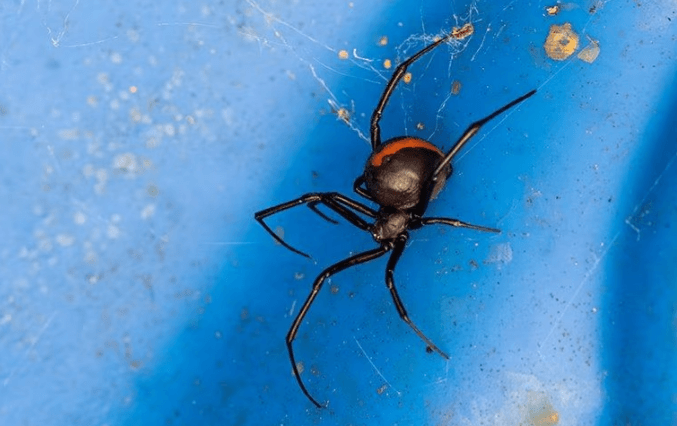
Professional Pest Control Keeps Spiders Out Of Your San Mateo Home
The secret to controlling spiders is controlling their food sources. Spiders don't eat what we eat. They eat bugs and small animals. Some of the things spiders eat are flies, mosquitoes, ants, cockroaches, moths, butterflies, centipedes, crickets, and salamanders. You might notice in this list that some of the creatures spiders eat are considered pests. But, while spiders provide a form of all-natural pest control, they aren't a great replacement for having a human take care of your pest control needs. Let's be honest. Spiders lack the professionalism to do a thorough job. It might have something to do with the fact that we don't ever pay them to take care of pests for us. Only the spiders know why they only address a fraction of the pests around our homes. There is another benefit to having a human take care of your pest control; humans aren't nearly as icky as spiders. Just saying. So, in our humble opinion, it is always better to hire humans. Today, we're going to look at a few ways you, as a human, can take care of pests around your home in a way that is far better than what those spiders will do. By doing this, you'll remove the food sources spiders want to find in your yard and home. If you like the idea of using all-natural spider control to deal with spiders in your house, strap in. We have some fun tips to share with you. If you'd rather have a professional get rid of spiders for you, we can help with that too. Jump to our contact page for pest control in San Mateo. We're always ready to help. With that said, let's look at some of the spiders you can expect to see on your property and in your San Mateo home.
Types Of Spiders That Invade San Mateo Homes

It is helpful to know what you're up against when dealing with pests, and spiders are no exception. All spiders are not the same. Some love to live in our homes and others don't. Some make webs. Some don't. Let's take a quick look.
Common House Spiders: Any spider that commonly finds its way into homes is considered a common house spider. The most common spiders in San Mateo homes are aptly named American house spiders. They're the tiny spiders with the bulbous abdomens. They're also the ones that make all of those wispy webs in the upper corners of your home. You never see these spiders in those webs because they tend multiple webs and are active at night. During the day, they typically find places to hide. Removing webs will deter these spiders. You could even make them want to go find another house to live in. But, if they decide to stay, don't worry. They're mostly harmless spiders. They rarely bite and bites do not amount to more than an itchy red welt.
Brown Recluse Spiders: These spiders commonly get into homes and stay permanently, but they deserve their own section. Unlike common house spiders, brown recluse spiders are not harmless. A recluse has a venom that is able to cause necrosis. Disfiguring wounds may result when necrosis spreads under the skin. The good news is that recluse spiders are reclusive and rarely bite unless threatened, and disfiguring wounds are rarely the result. Still, it is best to not have these spiders in your San Mateo home because, if left unchecked, they can grow a population of thousands.
Black Widow Spiders: These spiders are not common house spiders, and that is good news indeed. A bite from a widow spider can send you to the hospital. Seeing these small, black spiders with their red hourglass markings is cause for some concern, but you don't need to fear them. They don't go looking to bite you, and there are easy methods for preventing bites and keeping these spiders out of your yard. You'll focus most of your effort on the outside of your home to control black widow spiders.
Orb Weavers: There are many spider species in this group and they have an incredible variety of shapes, sizes, and other visual traits. It is difficult to tell them apart from each other, and also other spider groups. The distinguishing trait of an orb weaver is that it creates a web that looks like the webs you see on porches during Halloween. You'll find orb weavers outside. They rarely get into homes. A bite from one of these spiders will feel like a pin prick, depending on the species. They are attracted to moist habitats with lots of bugs to eat. Spider prevention is centered on managing exterior habitats. Orb weavers hardly ever get into homes.
So, that is the lay of the land. We'll use this information as our foundation, going forward. While there are other spiders we could mention, they are addressed in the same way you'll address these ones.
What It Means If You're Seeing Spiders In Your Home
It helps to know why you see spiders in your home. You have to get into the mind of a spider to use natural pest control methods to fully exclude them. Here are a few factors to consider.
Spiders get inside because they can. A spider isn't going to chew an entry point in your exterior. It will gain access using cracks, gaps, and openings that already exist.
Sometimes, spiders are a warning sign of water damage because they get in through rotted wood holes.
Seeing more spiders than normal is an indication that spiders are having success in your home. It is likely they've found a food source and they are growing a population. That means you have other pests.
You might frequently see spiders during mating season, which has nothing to do with pest control but bears mentioning.
The last reason is that you haven't frustrated them enough to make them leave. Did you know you can frustrate spiders? It's true. Spiders prefer to create webs in areas that are dusty. If you wipe down surfaces, you can make certain spiders want to relocate.
Most of the time, you'll never see spiders. They are typically active at night. But, no matter what time of day you see spiders, keep in mind why they're in your home. They get in through available entry points, stay for the food, and love a home that is dusty.
Five Naturally Effective Spider-Prevention Tips
Now you're ready to become an expert spider hunter. You understand what spiders to expect on your property and in your home, and you know why they invade. Let's look at some natural spider-prevention tips.
1. Exclusions. If spiders can't get into your home, your spider control is done.
- Seal gaps around doors, windows, pipes, and wire conduits.
- Repair screens.
- Make sure vents have covers.
- Use a foundation repair kit to address cracks in your foundation walls or slab.
2. Yard Work. It helps to reduce spiders around your home so you have fewer spiders trying to get into your home through tiny openings you don't see.
- Rake leaves up to remove spider hiding places.
- Remove dead branches, which attract the insects spiders eat.
- Remove yard clutter. Spiders hide in man-made items.
3. Web Removal. Getting rid of webs is another way to reduce spiders.
- Use a spider web removal tool to get indoor webs.
- Attach your spider web removal tool to a long poll to do outdoor web clean-up in hard-to-reach places.
4. Pest Control. When you reduce bugs, you naturally deter spiders. Those arachnids go where their food is found. Bugs will attract spiders to your home and make spiders want to stay when they get inside your home.
- Keep lights off where it is not a security concern.
- Replace white lights with insect-resistant yellow lights.
- Address flowering weeds to reduce nectar as a food source.
- Address aphids to reduce honeydew as a food source.
- Maintain healthy plants in your landscaping to deter pests in general.
5. Moisture Control. Spiders need water to drink and are also attracted to areas of high humidity. It is crucial to address moisture and humidity indoors and outdoors.
- Clean and repair your gutters.
- Address outdoor and indoor plumbing issues.
- Install a dehumidifier in your home if you have a humidity issue.
- Use the fan in your bathroom when taking a bath, shower, or when lounging in a jetted tub.
The steps provided above are often all that is needed to reduce spider activity and they may bring spider sighting below your threshold of comfort. But there are obvious benefits to getting year-round pest control to address spiders and other pests.
Professional Pest Control Makes For The Best Spider Control
Life gets busy. It is easy to neglect the chores that keep spiders out of your home. Plus, they're chores. Who wants to do chores after a long day at work? Professional pest control lets you put pest and spider control out of your mind. You also get the benefit of your pest control technician's training and experience. Your home will have the best possible pest management. Are you ready to be done with spiders in San Mateo? Contact Pacific Pest Management for service. We can guide you toward a service plan that meets your needs and addresses the pests you want to address. We're here to help. Jump to our contact page for assistance.

Our Reviews
Hear From Your Friends & Neighbors
At Pacific Pest Management, your satisfaction is our priority! See for yourself what our customers have to say about working with us.
-
"Fantastic Service"
Fantastic service! And Fast service! ..Customer for life and VERY reasonable rates.
Joyce W. -
"Knowledgeable & Efficient"
A+ service. I needed a pest inspection. I made one call and everything else was seamless.
Jesse B.



